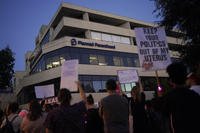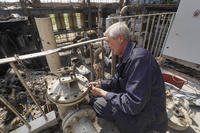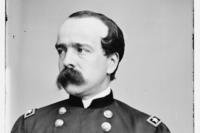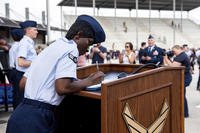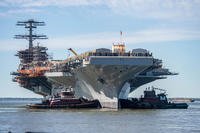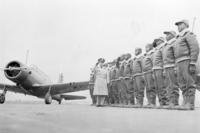When the planes hit the World Trade Center, Caitlin Stubbs of Sergeantsville, N.J. was a 6-year-old on vacation with with her family in California.
She remembers that her parents wouldn’t let her watch the TV, and she remembers learning later that her father would have been on business in one of the Twin Towers if not for the California trip.
The memory of the attacks on Sept. 11, 2001, that killed 2,753 in Lower Manhattan, 184 at the Pentagon, and 40 in Shanksville, Pa., may have faded as a motivating factor for young people thinking of joining the military. But for Stubbs, it’s still personal.
“If I could, I’d go Recon,” said the 17-year-old, who has signed up with the approval of her parents to report to the Marine Corps Recruit Depot at Parris Island, S.C. later this year.
The Marines don’t allow women to serve in its Force Reconnaissance teams of special operators. She has set her sights on joining one of the Female Engagement Teams operating in Afghanistan. The teams reach out to women who are barred by tradition from speaking with unrelated males.
Eleven years after 9/11, about 12 percent of potential recruits still cite the terrorist attacks as a factor that made them want to join.
Contrary to popular belief, recruiting offices didn’t fill up after 9/11 like they did after the attack on Pearl Harbor. A modest rise in enlistments followed 9/11, but that increase quickly dissipated as the nation got caught up in two grinding wars.
By 2006, the services were missing recruiting goals. They began lowering standards and offering enlistment bonuses to draw volunteers. In 2003, 94 percent of Army active-duty recruits had high school degrees. Four years later that number had fallen to 82 percent, according to the Army Recruiting Command.
The crash of the stock markets and the resultant effect on the economy in 2008 turned the numbers around.
“Historically, an increase in the civilian unemployment rate leads to an increase in enlistments,” said Beth Asch, a senior economist specializing in military personnel studies at the Rand Corp.
Since 2009, the services have all exceeded their active-duty and reserve recruiting quotas in the best sustained period for enlistments in the history of the all-volunteer military.
The Defense Department’s most recent recruiting and retention report showed that the trend was continuing; all four services met or exceeded their goals.
“For recruiting outcomes, there are a number of factors at play,” said Asch. “After 9/11, you see a bump up [in enlistments], but it did not have a long-term effect. Now, it’s starting to reflect the usual factors – service to country, contributing to something larger than yourself, and the usual bread and butter type issues” of getting a job in a poor economy and access to the college benefits of the new GI bill, Asch said.
Outside the Army recruiting office in downtown Washington, D.C., a huge poster in the window played off the famous World War II “I Want You” figure of Uncle Sam pointing his finger, with a twist: “I Want You – To Know I’m Hiring.”
But desperation to get a job in a bad economy would not explain the enlistment Kenneth Edwards, who has a bachelor’s degree from Ohio State and a master’s degree from Valdosta State Univeristy. He has a job in the front office at George Washington University and decided to join the Army at age 33.
Edwards, who also served for two years with the Peace Corps in Romania, describes himself as a “risk taker.” Both his mother and father were career Navy, and “this is something I’ve always wanted to do,” said Edwards, who will report in November to Fort Jackson, S.C., for basic training.
“I want to change my life,” Edwards said. “I’ve always looked up to people in uniform,” he said. “I’m getting up in age and this is an opportunity to change your life,” said Edwards who will train to be a satellite operator and maintainer.
“The economy is one factor” in the long-running boost for recruitment, but “our surveys show that the number one thing is the desire to defend and serve the country,” said Kathleen Welker, a spokeswoman for the Army Recruting Command at Fort Knox, Ky.
With jobs hard to find, “people are more willing to look at the military” and “young people are always looking at a way to pay for college,” Welker said. “For the 17-24 year olds, most of them were young kids when 9/11 occurred but these kids remember where they were” when the attacks happened, Welker said.
There’s also what Army studies show is a “culture of selfless service” in the generation of “millenials” born after 1985, Welker said. The Army even has a term for it – “generational altruism.”
A variety of factors will always be at play in influencing young people to join the military, and the 9/11 attacks will always be among them in the New York area, said Lt. Timothy Irish, a recruiter at the 1st Marine Corps Recruiting District in Garden City, L.I.
“Everyone’s reason for joining varies but you’re always going to hear people cite 9/11 in our area,” Irish said. “They still remember, it still strikes home for them,” he said.
For Caitlin Stubbs, 9/11 combined with her family history to make the Marine Corps her choice. Her father served as a Marine in Vietnam and her older sister is slated for the Marines’ Officer Candidate School at Quantico, Va., next June.
“I just want to do the hardest thing possible,” Stubbs said. “We’re all here to serve our country.”
Rose Fangamou won’t even be serving her own country when she reports to Fort Leonard Wood, Mo., for training in a couple of months. Fangamou, 27, from the West African nation of Guinea, has been studying at Strayer University but doesn’t yet have a green card.
“Even though I am not from here, I love America,” Fangamou said, “and I have always loved the Army. I wanted to become an MP (military police officer),” but as a non-citizen she’s been assigned to logistics for lack of the necessary security clearances, she said.
“Once I have citizenship, I really want to be an MP,” Fangamou said. “It’s always been my dream. It’s what I want to do.”


